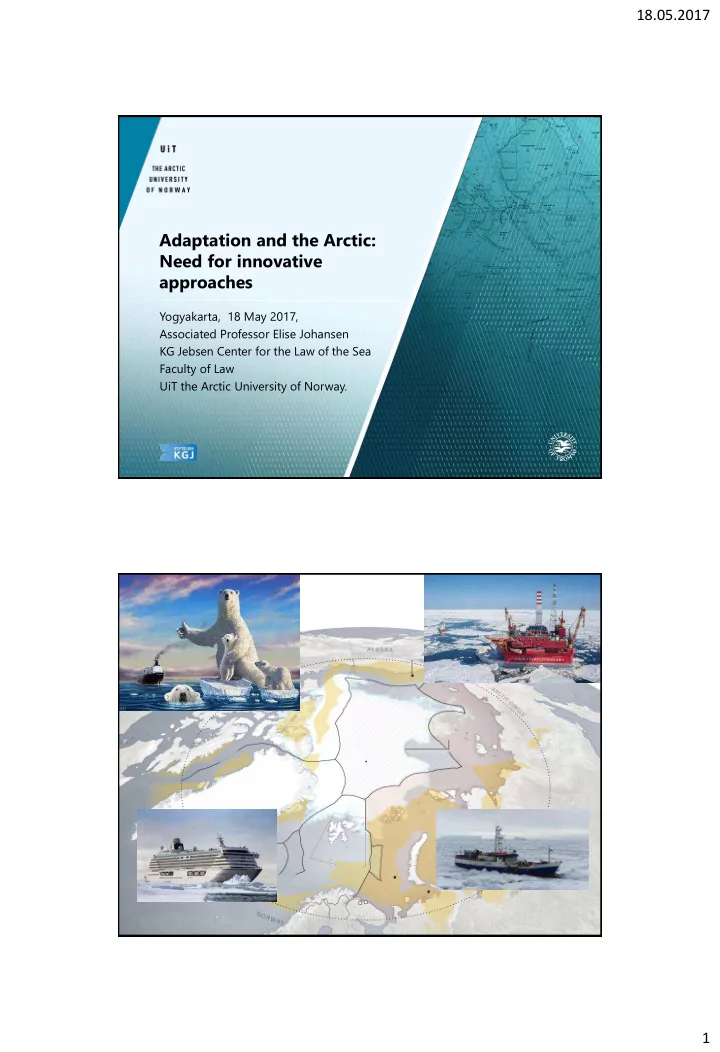

18.05.2017 Adaptation and the Arctic: Need for innovative approaches Yogyakarta, 18 May 2017, Associated Professor Elise Johansen KG Jebsen Center for the Law of the Sea Faculty of Law UiT the Arctic University of Norway. 1
18.05.2017 Governance of the Arctic THE ILULISSAT DECLARATION “In this regard, we recall that an extensive international legal framework applies to the Arctic Ocean ... We therefore see no need to develop a new comprehensive international legal regime to govern the Arctic Ocean.” 14.05.14 JCLOS / K.G. Jebsen Centre for the Law of the Sea Arctic Coastal States’ maritime zones 14.05.14 JCLOS / K.G. Jebsen Centre for the Law of the Sea 2
18.05.2017 Hydrocarbon Activities LOSC Article 77(1): • “The coastal State exercises over the continental shelf sovereign rights for the purpose of exploring it and exploiting its natural resources .” 14.05.14 JCLOS / K.G. Jebsen Centre for the Law of the Sea Frozen conflict 14.05.14 JCLOS / K.G. Jebsen Centre for the Law of the Sea 3
18.05.2017 United States- Canada Joint Arctic Leaders’ Statement �… due to the important, irreplaceable values of its Arctic waters for • Indigenous, Alaska Native and local communities’ subsistence and cultures, wildlife and wildlife habitat, and scientific research; the vulnerability of these ecosystems to an oil spill; and the unique logistical, operational, safety, and scientific challenges and risks of oil extraction and spill response in Arctic waters – the United States is designating the vast majority of U.S. waters in the Chukchi and Beaufort Seas as indefinitely off limits to offshore oil and gas leasing, and Canada will designate all Arctic Canadian waters as indefinitely off limits to future offshore Arctic oil and gas licensing, to be reviewed every five years through a climate and marine science-based life-cycle assessment.� 4
18.05.2017 Various International Frameworks and Commitments Concerning Oil Pollution International: • – 1972 Convention on the prevention of Marine Pollution by Dumping of Waste and Other Matter (London Convention) – 1973/78 International Convention for the Prevention of Pollution from Ships (MARPOL) – 1990 International Convention on Oil Pollution Preparedness, Response, and Cooperation Regional: • – 2013 Agreement on Cooperation on Marine Oil Pollution Preparedness and Response in the Arctic Bilateral: • – U.S.-Canada Joint Marine Pollution Contingency Plan – Norwegian-Russian Oil spill response cooperation Soft law instruments • – The Arctic Offshore Oil and Gas Guidelines (AOOGG) 14.05.14 JCLOS / K.G. Jebsen Centre for the Law of the Sea 14.05.14 JCLOS / K.G. Jebsen Centre for the Law of the Sea 5
18.05.2017 Regulatory Framework -Fisheries Regulatory Frameworks: • LOSC – 1995 UN Fish Stock Agreement – RFMOs and bilateral or regional organisations/arrangements: • the International Commission on the Conservation of – Atlantic Tunas (ICCAT) the bilateral (Canada and the United States) – International Pacific Halibut Commission (IPHC) the bilateral (Russian Federation and the United States) – Intergovernmental Consultative Committee (ICC) the Northwest Atlantic Fisheries Organisation (NAFO) – the North Atlantic Salmon Conservation Organisation – (NASCO) the North East Atlantic Fisheries Commission (NEAFC) – the North Pacific Anadromous Fish Commission (NPAFC) – the Norway-Russian Federation Fisheries Commission – the Western and Central Pacific Ocean Fisheries – Commission (WCPFC) the Yukon River Panel of the bilateral (Canada and the – United States) Pacific Salmon Commission (PSC) the annual Conference of Parties (CoP) to the CBS – Convention 14.05.14 JCLOS / K.G. Jebsen Centre for the Law of the Sea The Oslo Declaration: • Not authorizing fishing vessels to conduct fishing in the high seas area until one or more regional or sub regional fisheries management organizations or arrangements have established management measures • Establishing a joint scientific research program to promote ecosystem understandings JCLOS / K.G. Jebsen Centre for the Law of the Sea 14.05.14 6
18.05.2017 Protecting the Arctic marine environment Emission Initiatives/ work undertaken by: • – The IMO – The EU – The Arctic Council 14.05.14 JCLOS / K.G. Jebsen Centre for the Law of the Sea 7
18.05.2017 Efforts under the Arctic Council in protecting sensitive sea areas • Background AMSA report from 2009 (Arctic Marine Shipping Assessment) • Recommendation II D) “That the Arctic states should, taking into account the special characteristics of the Arctic marine environment, explore the need for internationally designated areas for the purpose of environmental protection in regions of the Arctic Ocean. “ • The Framework for a Pan-Arctic Network of Marine Protected Areas was drafted by an expert group that was appointed by the working group PAME in 2013 , and adopted at the ministerial meeting in Canada, April 2015 • Report by Det Norske Veritas submitted to PAME in 2014 Legal questions that may be raised Does the Arctic high seas areas • meet the criteria for being designated as a PSSA ? May PSSA be established on the • high seas? Would the size of the area be in • violation of the freedom of navigation? Is it possible to adopt dynamic • ATBAs? 8
18.05.2017 MPAs in the Arctic region of OSPAR 14.05.14 JCLOS / K.G. Jebsen Centre for the Law of the Sea 9
18.05.2017 18.05.20 17 10
18.05.2017 Thank you for your attention elise.Johansen@uit.no 14.05. JCLOS / K.G. Jebsen Centre for the Law of the Sea 14 14.05.14 JCLOS / K.G. Jebsen Centre for the Law of the Sea 11
Recommend
More recommend